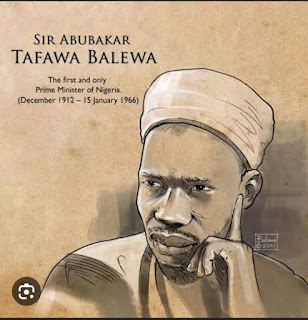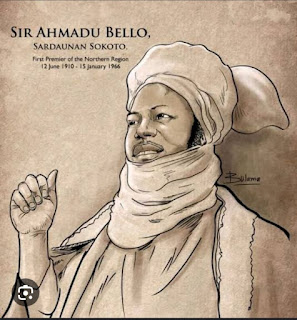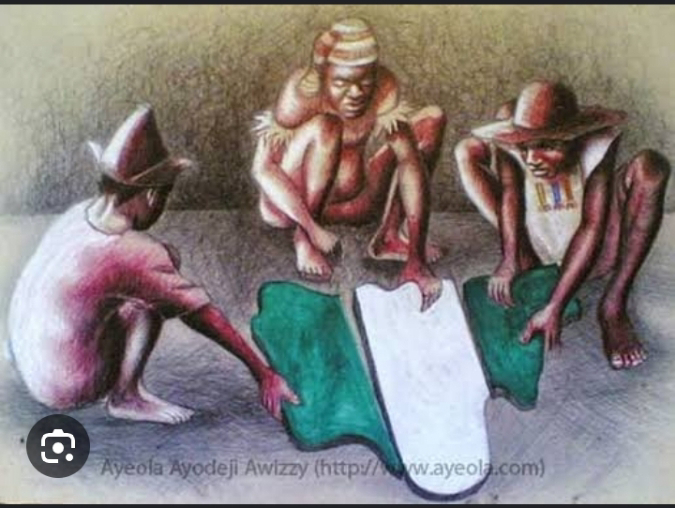The Life Story of "The Golden Voice Of Africa" Sir Abubakar Tafawa Balewa (1912-1966)
Biography
Sir Abubakar Tafawa Balewa KBE (Dec 1912- Jan 1966) a native of Bauchi was Nigeria's first and only Prime Minister. He was a lover of British culture and he favoured maintaining close ties with the British, a move which endeared him to the colonial masters. Sir Abubakar was also a defender of the North's special interest and an advocate of Nigerian unity.
Abubakar Tafawa Balewa was born in December 1912 in modern-day Bauchi State in Northern Nigeria Protectorate. His father Yakubu Dan Zala was a slave who worked in the house of the district head of lere a district within the Bauchi Emirate. Balewa began his education at a Quranic school in Bauchi; during the second British administration, colonial administrators pushed for Northern Nigerian natives to attend elementary school. Therefore after Quranic school Balewa was among the children sent to Tafawa Balewa Elementary School. Like many of his political contemporaries he later studied at Barewa college then known as Katsina college where he was student number 145. Ahmadu Bello his close friend and ally was two years his senior and also student number 87. The Kastina College was several kilometers from Bauchi, but Balewa could not afford train transport therefore he had to trek 400 kilometers to go to Bauchi, he trekked 40 kilometers a day and the journey usually took ten days.
Balewa studied in the college for five years after which he returned to Bauchi to teach at the Bauchi middle school. In 1941 after a period of student unrest in the school which implicated the Headmaster, Balewa was chosen to take the role of Headmaster. In the same year he also became acquainted with Aminu Kano who was posted to the school as a teacher, Kano also became one of the founders of the Northern People's Congress a party which Balewa belongs to. In 1944 Balewa, Kano and some few educated teachers where chosen to study abroad at the University of London's Institution of Education, upon returning to Nigeria he became an inspector of schools for the British administration but later joined politics.
Political Career And Acheivements
Balewa was elected in 1946 to the Northern House of Assembly and to the Legislative Council in 1947. As a legislator he was a vocal advocate of the rights of Northern Nigeria and he supported the hesitance of the North to accept independence based on the facts that the North and South weren't on equal footing.
Together with Sir Ahmadu Bello who held hereditary title of Sardauna of Sokoto, they planned the transformation of the then cultural organisation "Jamiyaar Mutanem Arewa" into the NPC. Balewa was elected vice president and the NPC won Majority seats in the regional House of Assembly. Balewa was among the new legislators and he later became a Minister after the implementation of the new electoral college under the 1951 Machperson Constitution where regional legislators were elected to the Federal House of Assembly in Lagos and among the Federal Legislators, 3 from each region were chosen as Minister. Balewa, Kashim Ibrahim, and Muhammadu Ribada were nominated to become Ministers. Balewa became Minister of works and subsequently occupied the post of Minister of Transport, his tenure saw the transformation of the marine and railway departments into a corporation and plans for the Niger Bridge and Kainji Dam were developed.
In 1951 NPC won Majority votes in the Federal House of Representatives and Balewa became the Chief Minister and designated Prime Minister. As a plot to unify the country for move for independence in 1960, Balewa formed a coalition with the Nnamdi Azikiwe led "National Council of Nigeria and the Cameroons" NCNC. He also invited the Action Group A.G but Awolowo was not buying the idea but his deputy Samuel Akintola allied with the NPC, this move led to crisis within the A.G which ended with Akintola became party chairman and Awolowo in prison.
In 1960 Nigeria gained independence and Balewa retained his position as Prime Minister and was re-elected in 1963, then Nigeria also adopted a new constitution which abolished the Monarchy and introduced a new parliamentary republic with Nnamdi Azikiwe as president and Head of State while Balewa was Prime Minister and Head of Government.
Assasination/Death
Balewa was overthrown and mudered during a military coup on 15 January 1966, as were many other leaders including Sir Ahmadu Bello. Sir Abubakar Tafawa Balewa was killed during a trip to Lagos with his Finance Minister, his body was discovered at a roadside near Lagos, six days after he was overthrown Balewa was buried in Bauchi. News of his assassination spurred violemt riot throughout Northern Nigeria and ultimately led to a bloody counter-coup in July 1966.



Comments
Post a Comment